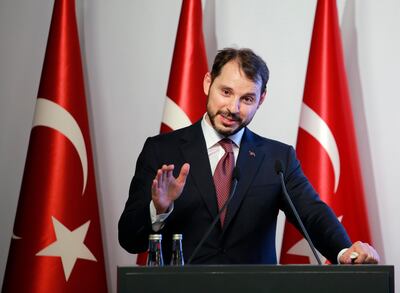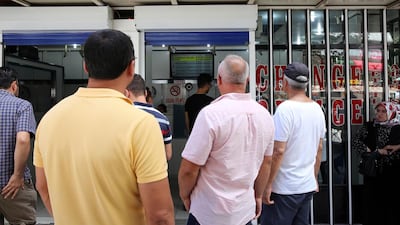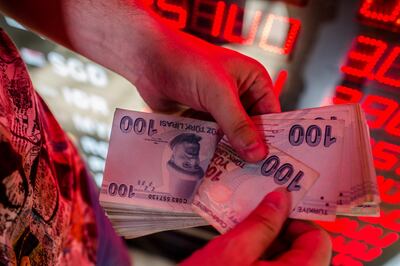President Recep Tayyip Erdogan’s son-in-law and finance minister, Berat Albayrak, was wiping the sweat off his brow on Friday as he outlined a new economic model to investors that would promote growth and lower inflation in Turkey in the coming months.
But in a calculated escalation halfway around the world, President Donald Trump announced via Twitter that he would be doubling tariffs on Turkish steel and aluminium. The Turkish lira had fallen again by the time Mr Albayrak concluded his remarks.
“Our relations with Turkey are not good at this time!” tweeted Mr Trump as he punished a NATO ally.
The latest salvo in a worsening diplomatic crisis between two strategic partners came against a backdrop of a currency crisis fuelled by Ankara’s own fiscal policies and prompted a siege mentality in Turkish officials’ public statements. They warned that the ongoing dispute with Washington could lead to a broader break in a relationship that survived the trials of the Cold War.
“Unless the United States starts respecting Turkey’s sovereignty and proves that it understands the dangers that our nation faces, our partnership could be in jeopardy,” Mr Erdogan said in an op-ed in the New York Times Friday. “At a time when evil continues to lurk around the world, unilateral actions against Turkey by the United States, our ally of decades, will only serve to undermine American interests and security.
“Failure to reverse this trend of unilateralism and disrespect will require us to start looking for new friends and allies,” he added.
The Turkish lira fell to 6.38 to the dollar on Friday as it crossed one historic low after another, a loss of around a third of its value in just one month and more than 15 per cent in a single day. The currency had spent much of 2014 hovering at just over two to the dollar.
Amid the ongoing currency crisis, Mr Albayrak’s speech offered few concrete steps to quell investor anxiety, other than pledging the Central Bank’s continued independence.

In speeches on Thursday and Friday, Mr Erdogan signalled he would not back down from the dispute with the US or reverse track to stem the currency’s fall, saying Turkey would emerge victorious from an “economic war,” calling on people to change their gold and foreign currency to liras, and proclaiming: “if they have their dollars, we have our people, our righteousness, our God.”
Despite the call, Turkish bankers reported branches running low on foreign currencies with one bank saying it couldn’t meet a customer’s request to withdraw $5,000.
The US Treasury imposed sanctions on Turkey’s justice and interior ministers in the beginning of the month over the continued detention of Andrew Brunson, a pastor held for nearly two years over allegations of espionage for Kurdish separatists and the Fethullah Gulen network – accused of masterminding a coup attempt in 2016.
But relations between Washington and Ankara, who control the two largest armies in NATO, have been sour for years. Turkey has been angered by America’s reliance on People’s Protection Units (YPG) in Syria in the campaign against the Islamic State. The YPG is the Syrian affiliate of Turkey’s Kurdish insurgent group, the Kurdistan Workers Party (PKK), and Ankara considers the group’s growing power on its border a major national security threat.
______________
Read more
As US and Turkey break up, experts warn of dangerous ramifications
Trump hits Turkey with doubled tariffs as lira tumbles
Trump's targeting of Turkey spells danger for its economy
______________
Turkey has also demanded that the US extradite Mr Gulen, the alleged leader of the coup network, who is living in exile in Pennsylvania, but no progress has occurred on the request.
Tensions with the US have only exacerbated an ongoing economic crisis. Mr Erdogan was sworn in after elections in June to a new term as president, but with vast new powers that officially inaugurated an executive presidential system in Turkey.
The leader of the nationalists and Erdogan ally, Devlet Bahceli, had called for early elections in August, but the president brought them forward even more, arguing that Turkey needed stability to navigate regional crises near its borders.
The move prompted speculation that Mr Erdogan was trying to pre-empt potential economic crises, as analysts warned that Turkey’s economy was overheating and its current account deficit was rising. A currency crisis would threaten the solvency of businesses that had taken loans in foreign currency but earned revenue in liras. Mr Erdogan’s AFK party rose to power in the early 2000s largely on the promise of economic reform and strong growth.
The president has resisted the economic maxim that raising interest rates was necessary to curb Turkey’s high inflation rate and his consolidation of power worried investors who were concerned over the central bank’s independence under the new executive system that came into force after June’s election.
Those fears grew after Mr Erdogan appointed Mr Albayrak, a close ally and family member, to the treasury and finance ministry, which meant the president would exert greater control over monetary policy.
Nevertheless, the focus in Turkey has primarily been on the US measures and how they threaten a longstanding alliance, forcing Ankara to look elsewhere for friends.
Turkey has worked closely with Russia in Syria, brokering peace talks and negotiating settlements in various parts of the country. The US has also been mulling sanctions against Turkish officials if the planned $2 billion (Dh 7.3 billion) purchase of Russian weapons systems goes through.
Amid Friday’s economic panic, Mr Erdogan spoke with his Russian counterpart, Vladimir Putin, over the phone.
Ibrahim Kalin, the Turkish president’s spokesman, argued in an article in the pro-government Daily Sabah that this was a “new low” in US-Turkish relations.
“The US runs the risk of losing Turkey as a whole,” he said.



